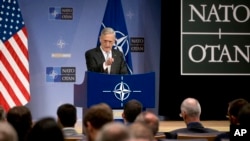U.S. Secretary of Defense Jim Mattis will press European allies on Wednesday to stick to a promise to increase military budgets as the United States offers an increase in its own defense spending in Europe.
For the first time, NATO countries have submitted plans to show how they will reach a target to spend 2 percent of economic output on defense every year by 2024, after U.S. President Donald Trump threatened to withdraw U.S. support for low-spending allies.
Fifteen of the 28 countries, excluding the United States, now have a strategy to meet a NATO benchmark first agreed to in 2014 in response to Russia's annexation of Ukraine's Crimea region, following years of cuts to European defense budgets.
It is unclear whether that will be enough to impress Trump when he attends a NATO summit in July.
While France plans to increase defense spending by more than a third between 2017 and 2025, Spain has said it will not meet the 2024 target, while Belgium and Italy are also lagging.
A multibillion-euro projected increase in Germany will not be enough to take Berlin up to 2 percent by 2024.
Mattis is expected to take a tough stance, according to Katie Wheelbarger, principal U.S. deputy assistant secretary of defense for international security affairs.
"He will address those who don't have national plans to meet 2 percent and suggest they really need to develop those plans," she told reporters.
Mixed message?
The issue of low military spending in Europe has long been an irritant in Washington. But Russia's military modernization, Islamist militancy and electronic warfare on computer networks have underscored Europe's heavy reliance on the United States.
According to NATO data, Britain, Greece, Romania and the Baltic countries of Estonia, Latvia and Lithuania meet, or are close to, the 2 percent goal, while France and Turkey are among those countries set to reach it soon.
One area of tension lies in the language of the NATO spending pledge of 2014. Allies committed to "move towards" 2 percent, while Trump now says 2 percent is the "bare minimum."
Trump has also set an example by proposing a $1.7 billion increase in military expenditure in Europe for 2019, as the United States leads NATO efforts to deter Russia.
But U.S. officials have also sown confusion about their support for a new defense pact to coordinate European Union defense policy and allow countries to club together to buy arms.
Wheelbarger warned that "we don't want to see EU efforts pulling requirements or activity away from NATO and into the EU." The U.S. envoy to NATO, Kay Bailey Hutchison, said there were concerns that U.S. defense companies would be shut out.
"We do not want this to be a protectionist vehicle for the EU," she said of the proposed pact.











